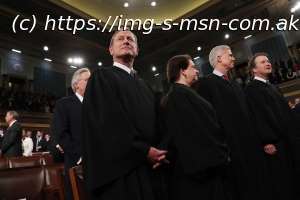The chief justice stood up to Trump, placated Democrats, and scored points for judicial supremacy.
© Provided by Slate
Chief Justice John Roberts at the State of the Union address. Pool/Getty Images
There will be much discussion in the coming weeks about the revelations of the Supreme Court’s COVID-19 term. But perhaps more than anything, we should focus on the battle of the titans that has played out this year between Chief Justice John Roberts and President Donald Trump. It certainly has been a years-in-the-making enterprise: Roberts was showing signs of Trump fatigue by the end of last term, and his frustration with the Trump administration’s shoddy lawyering and outright fabrication was evident by the time he thwarted the administration’s effort to put a citizenship question on the census. It’s fair to say that, by this time last year, it was clear that Roberts, a lifelong conservative, was—unlike many other lifelong conservatives—not prepared to give up on every institutional and ideological principle he’d ever held in order to cater to Trump’s tempestuous whims. It was also clear that Roberts would prioritize public respect for the Supreme Court and the federal judiciary over short-term gains for the president and his party.
This was evident not just in his judicial writing. It was clear when he punched back at Trump’s claims that there were “Trump judges and Obama judges” and again when he defended judges (including Merrick Garland) in his annual state of the judiciary report this past winter. It was also why we didn’t think Roberts would rush to intervene dramatically in the impeachment process. Whereas almost everyone in Trump’s ambit has proved to be almost fanatically transactional in their dealings with the president, credit Roberts with being principled. He has signaled, time and again, that he cares more about keeping the court above reproach, and above partisan politics, particularly in an election year.
To that end, the term-ending financial documentsdecisions are a masterwork. Both Mazars and Vance read as resounding victories for centuries-old principles about the limits of presidential immunity and Congress’ legitimate authority to conduct executive oversight. Both were interpreted as blistering losses for Donald Trump by Donald Trump. Yet they will compel the lower courts to dither and squabble in ways that will keep the financial documents away from the public eye for months if not years.






